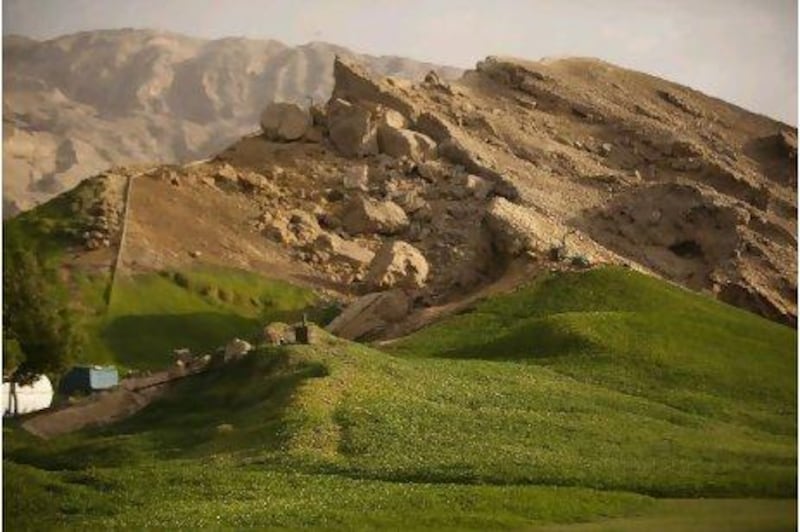AL AIN // For the hundreds of people who visit each day and the thousands who descend on weekends, the Green Mubazzarah park at the base of Jebel Hafeet is a place of rest and relaxation.
But for 340 maintenance staff, 16 inspectors and an equal number of security guards and community police officers, it is a different story.
During a three-day period this past Eid, more than 40,000 people descended upon the greenery and hot springs.
While the majority arrived and left their plots as they found them, many did not, leaving trash and burn marks in the grass.
Now, left with no choice but to take strong action to maintain the beauty and sanctity of the Green Mubazzarah, Al Ain Municipality is working towards introducing a system of fines of up to Dh10,000 – and possible prison time – for those found committing serious offences, such as lighting fires in undesignated spots.
“We are working with the Public Health Department of the municipality to introduce a system of fines that range from Dh1,000 to Dh10,000, and imprisonment for 24 hours,” said Ali Hamad al Muhairi, the community services division manager for the Central District of Al Ain, in charge of managing the city’s public parks and gardens.
“This is not just a park as many might believe, it is a historic place close to the hearts of those who know its history.”
Back in 2002, the Green Mubazzarah was just a rocky quarry, said Abdelnasser Rahhal, the general manager and part owner of Akar Landscaping, the company which looks after its upkeep.
“This is one of Al Ain’s greatest assets and a true oasis in the desert,” said Mr Rahhal. “Sadly, many take it for granted.”
A walk about the park on a recent Sunday morning, after the weekend crowds had left, revealed a mess.
There were dozens of scorch marks on the grass where visitors had lit fires for barbecues, their heat sometimes melting irrigation lines.
Hills that had been covered with green are left sandy and rocky, the grass eroded by those climbing to the highest peaks. An array of cans, bottles and discarded food marred picnic spots loved by families for their location, just metres from the flowing waters of the hot springs.
“Every week, especially during public holidays, it’s damaged. People throw litter and light fires where they are not supposed to. Some even throw coals over the Dh1,000 plastic solenoid valves [irrigation system] to barbecue and end up melting them. There needs to be strict enforcement, including hitting violators with hefty fines, like they do in Dubai.”
Despite private security guards and members of the Community Police regularly patrolling the area, maintaining order is a daunting task due to the popularity and sheer size of the park, which is spread across 1.6 million square metres. Inspectors are also limited in what they can do.
“I often go up to people and ask them to follow the posted rules,” said Mohammed al Kaabi, one of the municipality’s inspectors charged with maintaining order at the Green Mubazzarah. “They say ‘OK, OK’, and comply. But when I walk away, they go back to doing the same thing they were doing before. But when visitors are hit with fines, they will take things more seriously.”
Mr al Muhairi, who is Mr al Kaabi’s manager, believes fines are necessary but is also working towards other methods of getting visitors to follow rules. The measures include passing out brochures to all visitors, adding more prominent signs in a variety of languages that outline rules, and increasing the number of litter bins and designated barbecue pits.
“The Green Mubazzarah is a place for all to enjoy,” he said. “I would prefer that visitors be informed about what is permissible and know the consequences of violating the rules, rather than hit them with a stiff fine and possibly prison. But if that is what it’s going to take, then that is what we will have to do. It is unfair that the actions of a couple of hundred ruin the Green Mubazzarah experience for the thousands that come here every weekend.”
How water arrived at the Spring
Al Ain boasts two of the UAE’s three hot springs so it is little wonder the name of the city translates as “The Spring”. Visitors can find the first at the Green Mubazzarah, head to the second at Ain Al Faydah, an Al Ain district, and see the third in Fujairah. The springs’ 40° to 45°C water is the product of tens of thousands of years of seismic activity due to the country’s position on the edge of a tectonic area that originates below Iran. “As the tectonic plates moved over hundreds and thousands of years, subterranean cracks occurred and, through them, the underground water found a channel to travel to the surface,” explained Abdulrahman Fowler, a UAE University geology professor.






